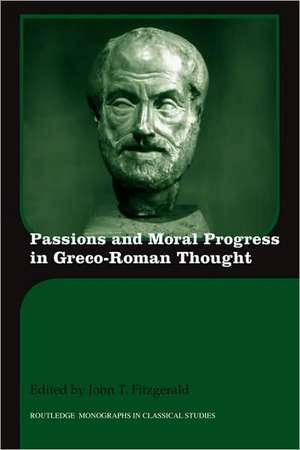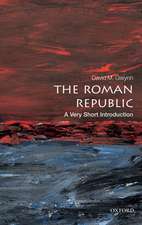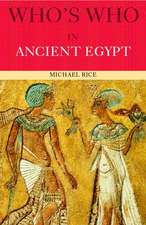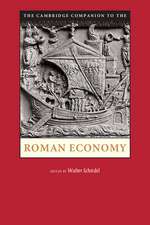Passions and Moral Progress in Greco-Roman Thought: Routledge Monographs in Classical Studies
Autor John T. Fitzgeralden Limba Engleză Paperback – 18 aug 2010
Recognising that emotions played a key role in whether individuals lived happily, ancient philosophers extensively discussed the nature of "the passions", showing how those who managed their emotions properly would lead better, more moral lives.
The contributions are preceded by an introdution to the subject by John Fitzgerald. Writers discussed include the Cynics, the Neopythagorians, Aristotle and Ovid; the discussion encompasses philosophy, literature and religion.
| Toate formatele și edițiile | Preț | Express |
|---|---|---|
| Paperback (1) | 494.11 lei 6-8 săpt. | |
| Taylor & Francis – 18 aug 2010 | 494.11 lei 6-8 săpt. | |
| Hardback (1) | 956.39 lei 6-8 săpt. | |
| Taylor & Francis – 26 noi 2007 | 956.39 lei 6-8 săpt. |
Din seria Routledge Monographs in Classical Studies
-
 Preț: 310.65 lei
Preț: 310.65 lei -
 Preț: 312.65 lei
Preț: 312.65 lei -
 Preț: 310.81 lei
Preț: 310.81 lei -
 Preț: 311.43 lei
Preț: 311.43 lei -
 Preț: 325.06 lei
Preț: 325.06 lei -
 Preț: 311.37 lei
Preț: 311.37 lei -
 Preț: 312.02 lei
Preț: 312.02 lei - 9%
 Preț: 935.67 lei
Preț: 935.67 lei - 9%
 Preț: 1039.83 lei
Preț: 1039.83 lei -
 Preț: 310.37 lei
Preț: 310.37 lei - 9%
 Preț: 970.53 lei
Preț: 970.53 lei -
 Preț: 312.56 lei
Preț: 312.56 lei -
 Preț: 311.18 lei
Preț: 311.18 lei -
 Preț: 325.55 lei
Preț: 325.55 lei -
 Preț: 309.90 lei
Preț: 309.90 lei -
 Preț: 311.41 lei
Preț: 311.41 lei - 9%
 Preț: 936.87 lei
Preț: 936.87 lei - 8%
 Preț: 383.06 lei
Preț: 383.06 lei - 48%
 Preț: 570.60 lei
Preț: 570.60 lei -
 Preț: 488.71 lei
Preț: 488.71 lei - 29%
 Preț: 995.97 lei
Preț: 995.97 lei -
 Preț: 482.27 lei
Preț: 482.27 lei - 18%
 Preț: 946.74 lei
Preț: 946.74 lei -
 Preț: 484.47 lei
Preț: 484.47 lei - 15%
 Preț: 427.16 lei
Preț: 427.16 lei -
 Preț: 369.77 lei
Preț: 369.77 lei -
 Preț: 386.77 lei
Preț: 386.77 lei - 18%
 Preț: 1109.51 lei
Preț: 1109.51 lei - 30%
 Preț: 849.65 lei
Preț: 849.65 lei - 23%
 Preț: 321.20 lei
Preț: 321.20 lei - 18%
 Preț: 956.39 lei
Preț: 956.39 lei - 15%
 Preț: 427.16 lei
Preț: 427.16 lei - 18%
 Preț: 1060.25 lei
Preț: 1060.25 lei - 15%
 Preț: 427.16 lei
Preț: 427.16 lei - 18%
 Preț: 1119.16 lei
Preț: 1119.16 lei -
 Preț: 371.71 lei
Preț: 371.71 lei -
 Preț: 452.14 lei
Preț: 452.14 lei - 26%
 Preț: 765.59 lei
Preț: 765.59 lei - 30%
 Preț: 819.48 lei
Preț: 819.48 lei -
 Preț: 416.22 lei
Preț: 416.22 lei - 18%
 Preț: 1050.78 lei
Preț: 1050.78 lei
Preț: 494.11 lei
Nou
Puncte Express: 741
Preț estimativ în valută:
94.56€ • 102.68$ • 79.43£
94.56€ • 102.68$ • 79.43£
Carte tipărită la comandă
Livrare economică 22 aprilie-06 mai
Preluare comenzi: 021 569.72.76
Specificații
ISBN-13: 9780415594912
ISBN-10: 041559491X
Pagini: 416
Ilustrații: 3 line drawings
Dimensiuni: 156 x 234 x 22 mm
Greutate: 0.59 kg
Ediția:1
Editura: Taylor & Francis
Colecția Routledge
Seria Routledge Monographs in Classical Studies
Locul publicării:Oxford, United Kingdom
ISBN-10: 041559491X
Pagini: 416
Ilustrații: 3 line drawings
Dimensiuni: 156 x 234 x 22 mm
Greutate: 0.59 kg
Ediția:1
Editura: Taylor & Francis
Colecția Routledge
Seria Routledge Monographs in Classical Studies
Locul publicării:Oxford, United Kingdom
Cuprins
An Introduction Part 1: Philosophy Aristotle and Theophrastus on the Emotions, William W Fortenbaugh. The Problem of the Passions in Cynicism, David E Aune. The Passions in Neopythagorean Writings, Johan C Thom. 'Be Angry and Sin Not: Philodemus versus the Stoics on Natural Bites and Natural Emotions, David Armstrong. Early Roman Empire Stoics, Edgar M Krentz. Plutarch on Moral Progress, Richard A Wright. Part 2: Philosophy and Literature Passion and Progress in Ovid's Metamorphoses, S Georgia Nugent. The Lassions in Galen and the Novels of Chariton and Xenophon, Loveday C A Alexander. Part 3: Philosophy and Religion Philo of Alexandria on the Rational and Irrational Emotions, David Winston. Passions in the Pauline Epistles: The Current State of Research, David Charles Aune. The Logic of Action in Paul: How Does He Differ from the Moral Philosophers on Spiritual and Moral Progression and Regression?, Troels Engberg-Pedersen. Moral Progress and Divine Power in Seneca and Paul, James Ware. Moral Pathology: Passions, Progress and Protreptic in Clement of Alexandria, L Michael White. Bibliography. Index .
Recenzii
'This multi-disciplinary book is a significant contribution to recent research on the emotions and moral progress' – Bryn Mawr Classical Review
"First rate contributions to understanding how the passions were construed to help or hinder moral progress in classical antiquity . . . Of interest to many classicists, biblical scholars, and historians of philosophy." -- Religious Studies Review
'This multi-disciplinary book is a significant contribution to recent research on the emotions and moral progress' – Bryn Mawr Classical Review
‘This volume represents a solid contribution to the ongoing discussions of the passions in antiquity. The editor’s assertions that the passions should be studied alongside notions of moral progress in borne out by these useful essays.’ – The Catholic Biblical Quarterly
'First rate contributions to understanding how the passions were construed to help or hinder moral progress in classical antiquity . . . Of interest to many classicists, biblical scholars, and historians of philosophy.' – Religious Studies Review
'...an interesting, informative and often stimulating collection of new essays.' – The Classical Review
"First rate contributions to understanding how the passions were construed to help or hinder moral progress in classical antiquity . . . Of interest to many classicists, biblical scholars, and historians of philosophy." -- Religious Studies Review
'This multi-disciplinary book is a significant contribution to recent research on the emotions and moral progress' – Bryn Mawr Classical Review
‘This volume represents a solid contribution to the ongoing discussions of the passions in antiquity. The editor’s assertions that the passions should be studied alongside notions of moral progress in borne out by these useful essays.’ – The Catholic Biblical Quarterly
'First rate contributions to understanding how the passions were construed to help or hinder moral progress in classical antiquity . . . Of interest to many classicists, biblical scholars, and historians of philosophy.' – Religious Studies Review
'...an interesting, informative and often stimulating collection of new essays.' – The Classical Review
Descriere
This book presents a collection of 13 articles on the topic of "the passions" and their connection with moral advancement in ancient Greece and Rome. Writers discussed include the Cynics, the Neopythagorians, Aristotle and Ovid.



















